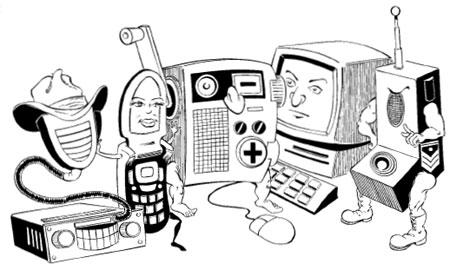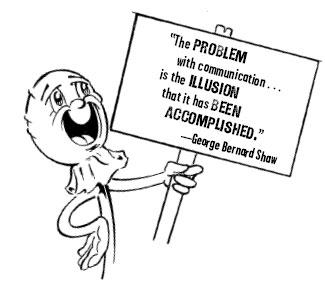When All Hell Breaks Loose (93 page)
Read When All Hell Breaks Loose Online
Authors: Cody Lundin
There are several battery-operated radios that also feature a built-in hand crank to generate power. These models are wonderful as you'll always have power, and the crank enables you to save stored batteries for other uses such as flashlights. Beware of cheaper hand-crank models that flood the market, especially in dark and dingy military surplus stores. I've also seen radios with a built-in solar panel for self-charging during sunny daylight hours. I can't overemphasize how important this piece of gear can be to your family's survival, so spend the money to purchase a brand-name, reliable radio. Free-playing radios such as the "crystal radios" composed of a coil of wire, a tuning capacitor, a crystal diode, and an earphone are also a possibility. World War II soldiers improvised crystal radios from their trenches by using coat hangers, the lead from a pencil, and a razor blade, among other parts, to keep up with the daily news.

Cell Phones
While cell phone coverage and quality has improved over the years, it still has much to be desired. The motto of one well-known provider, "Can you hear me now?" is all too appropriate at times. I know people who have cell phones on steroids complete with directional antennae, the thickest antennae wire available, and an amplifier, and yet during times of rain still have a problem getting reception, even when dropping from digital to analog.
Cell towers rely on regular AC power for their operation. During times of mass hysteria even those towers with backup power will be compromised, as everyone and their pet will be attempting to use their phone. Cell phones can also, like anything else involving complexities with many moving parts and people, simply fail to work when you need them most. Satellite phones are available if you have the money to pay for the minutes, yet even these phones could be taxed beyond their limits if everyone decides at the same time to pull an E.T. and phone home.
Cell phone batteries at the current time are hopelessly short-lived and sensitive to fluctuations in temperature, especially the cold, which sucks the power from the battery even when the phone is turned off. It's now common knowledge that the cell phone battery itself is a "bug." It can be used as a listening device by certain agencies, whether it's in the phone or not, to listen and record conversations unbeknownst to the owner of the phone. At least we can be assured that this power won't be abused. . .
While cell phones are cool, and they have saved many lives, they have also inadvertently killed stupid owners who put all of their welfare and self-reliance into a fickle, battery-powered machine with finicky reception in geographically challenged locations. Many places out West still don't have any hope of getting a signal. Ever try to make a cell phone call on the flats of the Painted Desert on the Navajo Indian reservation. . .can you hear me now?
Internet
Internet access to news, weather, and e-mail, like everything based upon electricity and phone lines, is vulnerable to chaos. Even satellite Internet powered by independent solar power can have problems. You may fail to get online due to a storm near your provider, hundreds of miles away, while the weather around your computer is sunny with blue skies.
SUPER-SIZED SOLAR FLARES AND YOU
"Our increasingly technologically dependent society is becoming increasingly vulnerable to space weather."
—David Johnson, director, National Weather Service
Technology junkies take heart. According to scientists, many forms of electronic communication and navigation, such as Global Positioning Systems (GPS), are vulnerable to solar flares. So what, you say? GPS is far from a glorified compass used only by people navigating the great outdoors. It is integral in newer cell phones to allow emergency personnel to find an owner after an accident and is responsible for navigating airplanes, automobiles, and ships, transferring currency to and from banks, and many other government and commercial activities.
According to a recent news report, a jumbo solar flare last December influenced every GPS device on Earth that was experiencing daylight at the time. Some GPS systems only burped and were reduced in their accuracy while others were completely knocked out of commission. Even more troubling and baffling to the experts is that the flare also affected some satellites and fiddled with the electrical grid. The ramifications of a more powerful solar flare are sobering; one could affect the entire way most countries conduct business, from the sale of fuel to food.
According to experts, there is no quick fix and the options that are available are very expensive. Put this pearl of wisdom in the back of your noggin and know there is something to be said for low-tech common-sense solutions to daily living.

Citizens' Band [CB] Radios
Breaker, breaker, Teddy Bear! Remember the movie
Smokey and the Bandit
with Burt Reynolds? What a classic. It seemed that no one in those happily bygone days was without a CB radio, a dorky handle (CB name), and a souped-up black Trans-Am with a golden eagle on the hood. My grandparents had a blast with their base station CB, and all of us pain-in-the-butt grandkids abused it often to report from our vehicle CBs that we were stuck in the mud (again) at the old bass fishing hole. I learned early that excellent communications meant that you could ramp up the stupid meter in your cousin's pickup truck with virtually no consequences.
The Federal Communications Commission established Citizens' Band radio in 1958, and there are now over 51 million CB users throughout the United States. In fact, CB radios are the most accessible means of communication for the general public. Their range is typically ten to twenty-five miles but ranges of well over a hundred miles have been commonly reported. Since many users share only a few channels, interference from others can be common, especially during an emergency. CBs are useful as a neighborhood communications system or when on the road to get real-time information from other drivers about blocked roadways or other hazards.
Channel 9 is the nationwide official channel for emergency use and traveler's information
. Volunteer members of the Radio Emergency Associated Communications Team (REACT) monitor channel 9 almost continuously all across the United States. These selfless guardian angels typically handle over 100,000 calls for help each year. Some highways and neighborhoods have REACT logo signs readily visible to alert others to their assistance with emergency communications.
Shortwave Radios
"[A
FTER A DISASTER
]. . .E
VEN WITH TECHNOLOGY THE WAY IT IS, IT'S ALWAYS AMATEUR RADIO THEY FALL BACK ON
."—L
LOYD
H
ALGUNSETH
, D
ISTRICT
E
MERGENCY
C
OORDINATOR
, Y
AVAPAI
A
MATEUR
R
ADIO
C
LUB
With a spectrum of 1.7 to 30 megahertz, shortwave radio puts you in touch with the unfiltered world of international radio whether you live in town or country. With the right equipment, it can also be used for two-way communications instead of just listening. Almost every town of any size has an amateur radio club. These radio "hams" can tell you whatever you want to know regarding FCC licensing rules and its use for ham radio transmission, and members often have new and used radio equipment for sale. While some shortwave radios require regular 120-volt power for operation, there are many battery-operated (and even a hand-crank or two!) models available. The world of the ham radio operator is almost limitless and a golden asset during and after any emergency. Thank you, ham operators, for your dedicated volunteer service to others in their time of great need!

Two-Way Radios [Walkie-Talkies]
Like everything else in the communications world, walkie-talkies come in a wide variety of styles, channels, power outputs, and prices. They can be priceless when needing to communicate with a minimum amount of interference when a loved one is a short distance away. Several models feature built-in NOAA weather-band reception that would prove a valuable asset to the survivor. I remember getting a cheap pair of walkie-talkies for Christmas when I was a kid and they ranked high on the "cool meter." They still do, especially when the cell towers aren't working. I have used them on road trips between multiple vehicles when needing to keep in contact with the other car. Some businesses use certain models for their communication needs of up to three to five miles. Other models are commonly sold in outdoor and camping stores and are frequently used in the backcountry for everything from a couple of day hikers keeping in touch to hard-core search-and-rescue missions involving the coordination of dozens of people. If you feel this type of communication is relevant for your family, research which model(s) would be most applicable for your needs.
Field Telephones
Available from some military surplus stores, hand-crank field phones that run off D-cell batteries will allow communications for many miles. Although interconnected by a wire, they have their unique applications.
Scanners
Scanners allow you to receive broadcasted information from a variety of sources such as police, ambulance, firefighters, ATF and Border Patrol agents, U.S. Customs, the Federal Emergency Management Agency (FEMA), the National Oceanic and Atmospheric Administration (NOAA), and an unending number of ham radio operators. These people often have cutting-edge information regarding a wide variety of disasters or local emergencies. Volunteer Search and Rescue personnel (SAR) commonly use some type of scanner or scanner/radio combination to listen in on sheriffs' calls that would signal a search-and-rescue mission. You're advised to know the laws regarding intercepting another party's conversation, which mostly revolve around the no-nos of using the intercepted communications for personal gain or discussing it with others. For our intentions of keeping track of events before or after a disaster to keep our families safe, we should be in like Flynn. Regardless, check your state's laws regarding the legal use of scanners.
